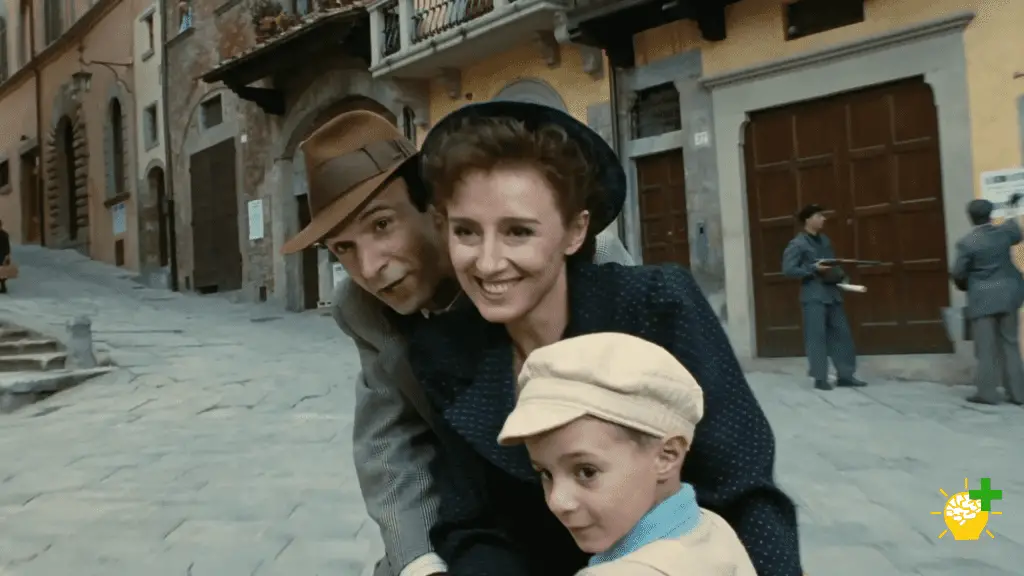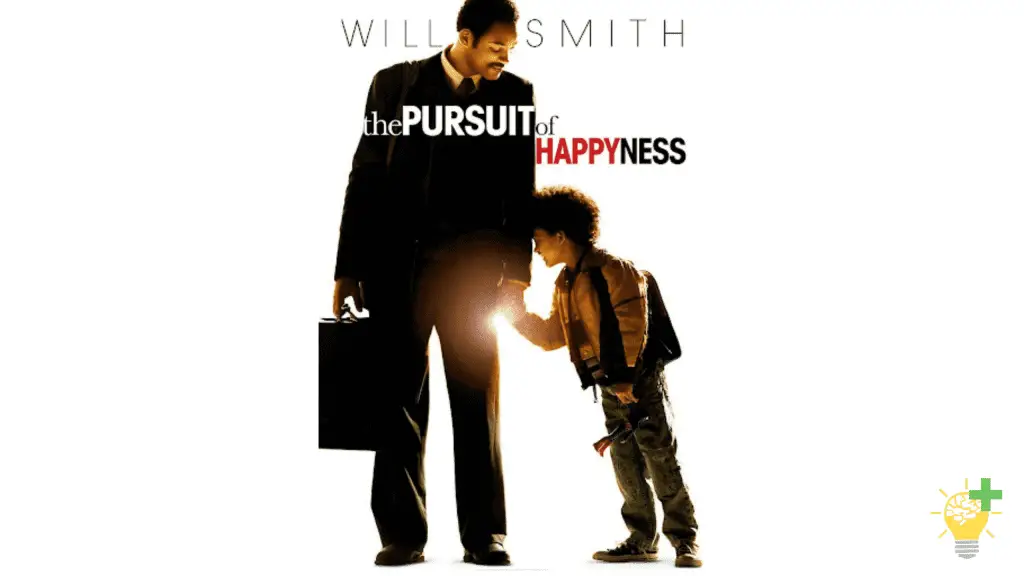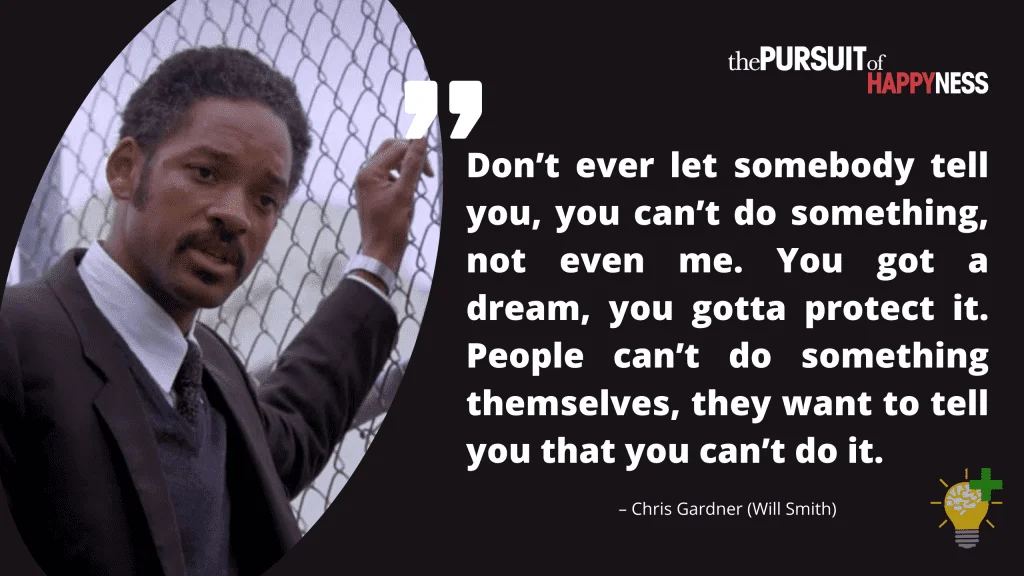Everything can be taken from a man but one thing: the last of the human freedoms—to choose one’s attitude in any given set of circumstances, to choose one’s own way.
Viktor Frankl
Due to circumstances out of anyone’s control, some people grow up faster than they would have chosen on their own. Either you can find strength through those circumstances or embrace it as your choice; after all, what are we if not a collection of our choices?
The film Life is Beautiful speaks about an extreme difficulty being thrust upon you and the opportunity to face it. Either you can think of it as a challenge to overcome or cry over it, wallowing in self-pity. It isn’t to say that you won’t feel the weight of the situation on your shoulders or you wouldn’t collapse at some point. This movie shows how the human spirit can handle the unfathomable, with joy and humor, for your loved ones and the people around you.
The movie’s protagonist finds himself facing the most challenging situation with a smile for his son. Roberto Benigni finds himself in a situation where he has to deflect the brutal and cruel reality of the problem with humor. We all have known people to whom humor comes naturally, but it’s one thing to convey humor about a hard time and another to endure the reality of the Holocaust employing humor.
The Holocaust is one of, if not the most gruesome realities that the world still struggles to comprehend, and no one should ever wholly comprehend. To comprehend is one step closer to normalizing, and we will never normalize that horrific event in history.
We already see how the world is plagued with hatred for a race, intolerance of different religions, contempt for political points of view, and even diverse cultures are under attack. If this behavior is normalized without realizing it – where will it lead us.
No sane person can imagine another Holocaust. Stories from the Holocaust are nothing short of a nightmare for the families who suffered.
I’m sure you have come across books based on the Holocaust or movies that depict the brutality unleashed on innocent people for following a different religion. The worst of humanity came out of it, and I pray that humanity will never experience it again.
Hundreds of books share an account of the events, and many movies remind the present and future generations of how people can give up on humanity and choose inhumanity instead. Books like Ann Franks Diary will take the life right out of you and make you think of the people that had to live it.
Those books and movies are a reminder to strive to be better human beings.
Why is it important to Have Movies and Books on the Holocaust?
Before we jump into the movie Life is Beautiful, I would like to focus on this critical but relatively ignored topic.
In our millennial generation, we are often about moving past things at a glance. We don’t linger on issues because we are always in a hurry to jump onto the next issue. We have gotten immune to the incidents around us and have dissociated ourselves from the reality of it all.
We must remind ourselves that these issues involve real people and can implode into more significant disasters if we don’t get serious. We have seen how prevalent racial violence and intolerance towards differences have become and we’re just now taking it more seriously.
Books detailing and movies depicting the lived realities of the Holocaust explore how dreams were crushed just because a ruthless dictator was intolerant to difference. These books and films serve as a bitter truth to the dark reality of the Holocaust and how we can never allow something like that to happen again – EVER.
For this very reason, I think the movie “Life is Beautiful” is a must-watch for each one of us as we all need to remember what happened when humans detached from reality and exerted superiority over others.
It should make us resilient in the face of increasing racial intolerance and difference and stand on the right side of history.
I assure you this movie is the ultimate tearjerker. You will feel it in your heart, and hopefully, we will all resolve never to allow such devastation ever to occur again.
Life is Beautiful – Official Trailer
The Premise of the Movie
Life is Beautiful is an Oscar winner for best actor and best foreign film addressing the Holocaust.
It sheds light on the overpowering love a man has for his son and wife. It shows us how love for a child and wife can make you overcome fears and thoughts about how you would want to protect a child from the trauma of a concentration camp.
It shows how you would use humor to attempt to create some semblance of a normal childhood for your child amid a life-altering crisis, even when your own life is at stake. It is genuinely heartwarming to see a father’s love for him and is the premise of “Life is Beautiful”. The overpowering love of a man for his wife and son and how he made a fool of himself to make the situation a little less difficult.
The movie starts with Roberto Benigni in his element of humor and charms a beautiful teacher by weaving a world of magic around her. He directed and co-wrote the film that stars him as Guido, a hotel waiter in Italy in the 1930s.
Someone who had the privilege to know Roberto in real life will know he was meant and born to play this character. It defines him as a person and actor, and the movie shines bright on this fact. The movie is divided into a comic treat and a teary ride through the intense emotions channeled by the situation.
The character Guido that Roberto Benigni plays is reminiscent of Chaplin through his adventures in the movie.
Guido: The Male Lead
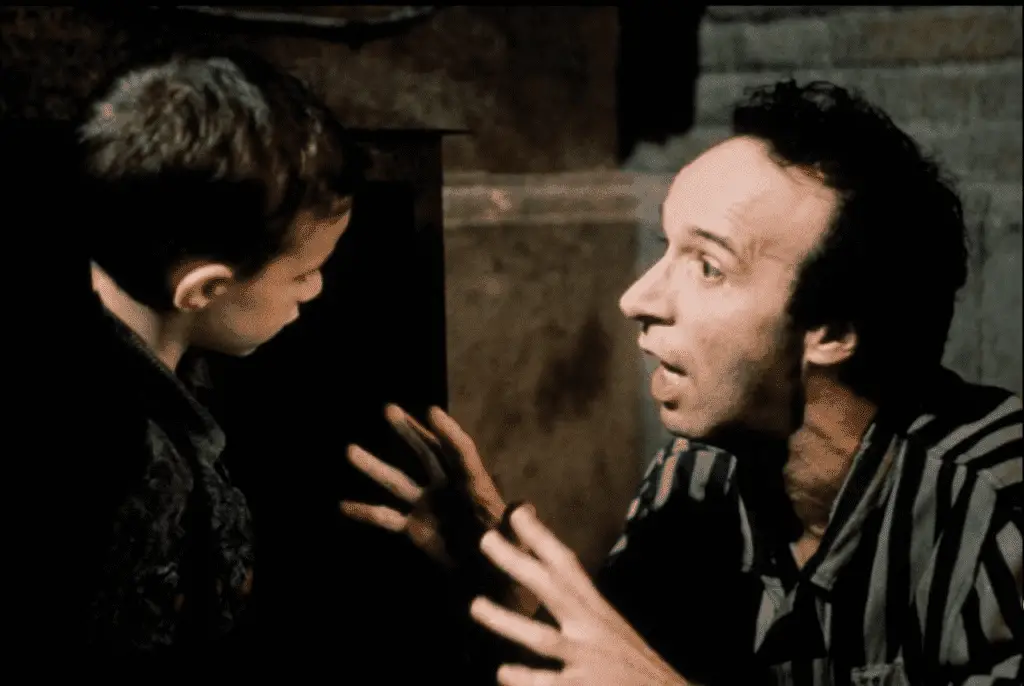
Guido Orefice (Roberto Benigni) is introduced as a carefree and happy-go-lucky type of guy who arrives in town in a car with failed brakes and is mistaken for a dignitary visiting the town. He falls in love with the Dora, played by the gorgeous Nicolleta Braschi, which happens to be Benigni’s real wife—introducing conflict between him and her fiancé.
Dora’s fiancé happens to be a fascist ideology believer and the town clerk, but Guido doesn’t care because he is mad in love with her.
He makes friends with a German doctor who is a regular visitor at the hotel and would listen to his “love riddles” intently. It would later appear as if he was meant to be placed in Dora’s life for all fate has in store for them.
We don’t understand what the world has in store for us until the time comes, which happened in Guido’s case.
No one would have imagined what this fairy tale love story would lead to and how things would unfold in the future.
The movie is one long comic chapter revolving around their love story, and you will enjoy the subtle timing. Dora even conspires to meet him under a table in the hotel, and you’ll enjoy the cute love scenes; however, the story shares a complex reality. Only well into the movie you are introduced to a piece of crucial information that will turn the world of Guido upside down.
At one point, Guido lectured on Italian racial superiority when mistaken for a school teacher, which happened to trigger a lot of people in town. People tend to invoke their feelings of anger and despise someone if the person in question doesn’t conform to their set of beliefs and ideas.
It was the luck of fate that the events turned out in Guido’s favor and his survival in the town. But Guido is a Jew, and Dora has fallen in love with him without realizing this will land them in a concentration camp in the future.
Five Years into the Lives of Guido and Dora
Five years pass, Guido and Dora are happily married and dote on their 5-year-old child Joshua.
The time was 1945 when Jews were being put into the concentration camps by the Nazis and shipped to death camps by rail: Guido, a Jew, and his son Joshua for the same fate. Dora, who wasn’t a Jew, requests to go with her husband and son to be with them.
Guido was aware of its reality and where they were headed—not wanting his son to go through the cruelty of the situation at such a young age. His instinct was to protect his son at all costs, so he invented a game to turn this brutal reality into a comic adventure for his son. He turned it into an amusing act of being left behind and how terrified he was of missing the train.
He shows courage in the face of death and how his love for his son conquered his fears and made him turn the situation into a humorous little adventure. Also, it is important to mention how Dora, who the fascists would have easily spared for not being a Jew, insists on going along. It wasn’t highlighted, but you have to admire her courage and love, which made her fearless.
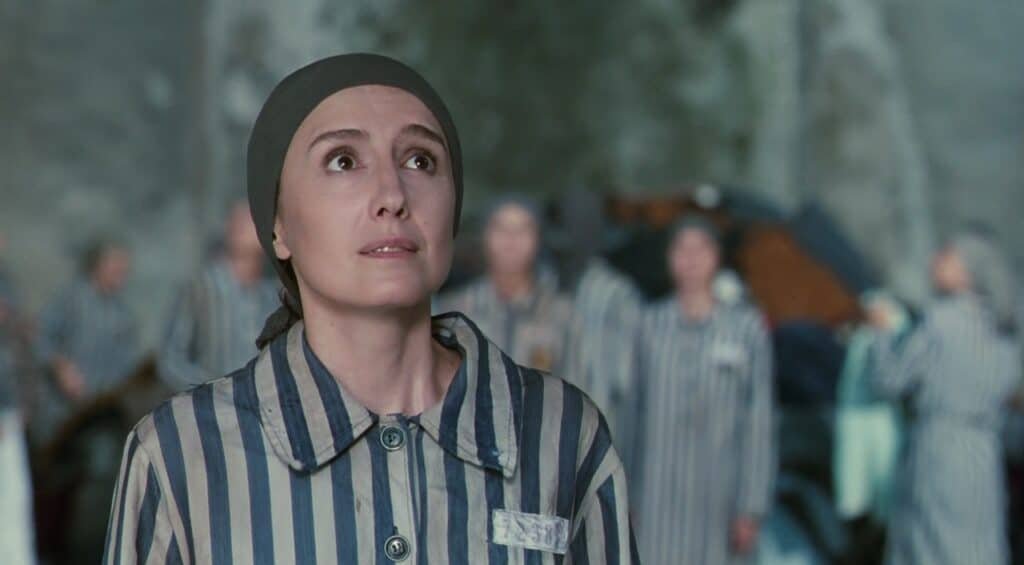
Life in the Concentration Camp
Guido designs an elaborate fiction to spare his son of the horrors of the concentration camp and protect him. He weaves it like a game, and his son plays along. The first one to get to 1000 points will win a tank, not a toy tank but a real tank that Joshua will get to drive all around the town.
Guido acts as a translator for a German who keeps barking at the inmates to quiet his son’s fears. He tries his best to hide his son from the camp guards, and he has placed rules to make Joshua stay away from the guards on the platform and remain absolutely still.
The horrors of concentration life are well-illustrated, but the movie does a fantastic job showing how much Guido invents to insulate his son from the tragedy.
Should You Watch “Life is Beautiful”
I think it’s a valid question if watching this movie is worth your time?
Life is beautiful is a controversial take on a rather serious event in history. It has faced criticism for its unique take on the Holocaust, but I don’t feel like it makes light the circumstances, but rather the capacity we have to cope with devastating situations.
Nothing can capture the grim realities of war or the concentration camps; they can only provide glimpses. If the glimpses of it send shivers down your spine, you can imagine how it would have been in real life.
Movies about the Holocaust, like Schindler’s List and Son of Saul, were criticized for their inability to capture the brutality of the concentration camps but was the criticism valid? Even if the criticism is valid, it shouldn’t stop you from watching the movie for yourself to have an opinion of your own on the matter. Sometimes people get blinded by the ideological or political bias that they consciously or unconsciously have, stopping them from seeing it with an open mind.
Every human being comprehends reality differently. Each of us has this unique quality to think of a situation totally different from the other.
Some people are good at seeing through the problem and reacting to it, while others are more compassionate and supportive. It makes us who we are, precisely what explains the different takes of different directors and writers on the Holocaust.
Everyone’s perception of it is different, and it’s bound to be as we all are different and through sad retrospect is one thing the Holocaust teaches us that “Different isn’t bad and shouldn’t be despised.”
This is at the heart of all these stories, and we’re still addressing the same issue today.
Benigni’s method was to make it light while keeping its essence alive, and we can make it through. Audiences felt the pain and helplessness of the father of that situation while he masked it with comedy.
In real life and movies, people rise to adversity with whatever they are left with, with whatever control they have on the situation.
In the Diary of Anne Frank, Mrs. Van Dam’s focus on her coat and how obsessed she was with her coat will come across as bizarre and absurd. Realizing that she was in a hideout with no future in sight, this was her coping mechanism surfacing against the harsh reality of it all. It provided her with the comfort that not everything is lost by placing her sense of comfort in that coat.
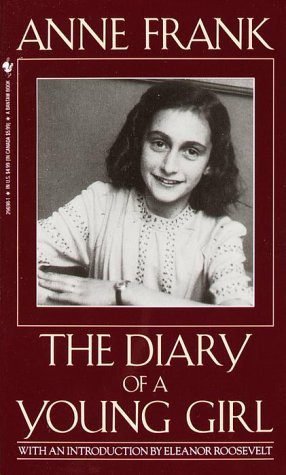
While in the movie Life is Beautiful, the father uses his natural talent to protect his son from the harsh reality of the Holocaust because that’s what he’s left with.
It is bound to resonate with people as it won’t take away from the fact that the Holocaust is beyond comprehension; whatever we can imagine of it wouldn’t be sufficient to assume what happened there. We can only imagine with whatever information we are left with through things like Anne Frank’s diary, lived experiences of the survivors, and through art. All of this serves as the remnants of the darkest period of humanity.
Is the Criticism Warranted
In an interview at the Toronto Film Festival, Roberto Benigni mentioned how the film has stirred up hatred in Italy from those of a particular political persuasion. At Cannes, it offended some critics for using humor in connection with the Holocaust. They found it offensive to make light of such a dark situation. What might have been offensive to such a diverse crowd was the ingenuity of the art.
Benigni isn’t making fun of the Holocaust but uses a different lens to illustrate it. He’s highlighting the courage that a man possesses in the face of adversity. Guido used what was at his disposal for his son’s sake. He might have picked up a gun if he had one or evaded the Nazis if he had an assured escape. But not without his son, so he did what he could with the choices available.
Ann Frank’s father didn’t have the choice to stand against the Nazis to protect his daughter’s dreams and his family’s fundamental right to live a free life, but he chose to allow his daughters to have whatever they could in the hideout.
If you have read her diary, you would know how Anne and her sister learned different languages and prepared for school, not knowing if they would ever be able to have a life again.
These examples show humans’ resilience; they didn’t let hope die in them. Hope is one thing that helps us survive through it all, and without it would have been impossible for Anne and her family to keep their spirits high in the darkest time of their lives.
This hope helped them survive the struggles of the hideout, make peace with whatever they had, live with the feeling of uncertainty and not knowing if they would see the light of the day again. They used to banter at the dinner table and make light of the situation. Will you accuse a family living the Holocaust in a hideout of making light of the Holocaust? The answer is evident to us all, and it should be enough of an answer for us all to skip the criticism.
The movie softens the harsh reality of the death camps and is a work of fiction. There was probably not a Guido and someone of his talent in the actual death camps. The creative liberty that comes with art made it possible for Benigni to put a character like Guido in the death camps and present a story like this for our viewing pleasure.
I felt Life is Beautiful uplifted my spirit and gave me hope in humanity, and I think you will see the same.
Relevance In Today’s World
The relevance of a movie like “Life is Beautiful” in today’s world is how time repeats itself. The heightened emotion of racial and religious superiority led the Nazis to become fascists and with an open policy of hatred for everyone who didn’t align with their racial and religious policies. If we look around, we will see this emotion rising, and people with bias are blinded by it.
The Rwanda genocide, violence against the black community in America, violence against religious minorities in India and around the globe is a few examples evident today. The political leaders are invoking these emotions of hatred and violence for all the reasons that fulfill their goal of having an authoritarian state. The feelings of xenophobia and putting religion against religion, cultures against other cultures, and ethnic diversity to the advantage of political point-scoring and gaining voters is similar to how Hitler gave rise to a Fascist regime.
Now is the time to rise above these differences and let the opportunists know that we are better than this. Movies like Life is Beautiful, Schindler’s List, and The Diary of Anne Frank remind us not to commit the same mistakes, not go down the same path, not lose faith in humanity and diversity, and what a beautiful gift life and harmony are.
These movies intentionally make you uncomfortable and aware of what happened in the past and what shouldn’t be allowed to happen.
Movies and books on the Holocaust help us better understand what it means to be human in the face of prevailing hatred and violence.
Conclusion
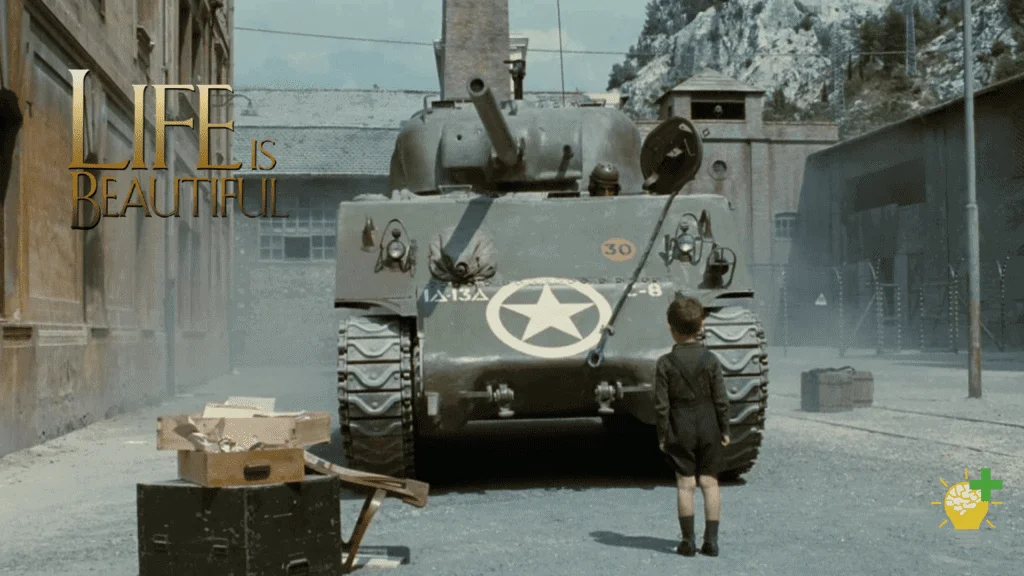
Life is Beautiful isn’t about the Nazis and the fascists but the spirit of humanity. It attempts to restore our faith in humanity that there’s still hope for humanity to thrive in our deepest and darkest times. It sheds light on the path that a father took to protect his son from the harsh reality of the Holocaust and how love for your own can triumph any hardships.
It will invoke countless contradictory emotions in you. You will feel the overwhelming power of love and the overwhelming power of hatred simultaneously. You will feel the power of humor and the power of reality. You will feel how humanity can shine through adversity, and it’s the ability to come through it all powerfully.
It’s a lesson covered in layers of joy, humor, and pain that we all have a responsibility towards each other and one that is beyond any religious or national obligations.
We should always be kind and tolerant towards each other and never let our negative emotions take over the best of us.
ThinkPositiveCheck.com / Jon Peterson
We should always be kind and tolerant towards each other and never let our negative emotions take over the best of us. We can’t encompass the reality and cruelty of the Holocaust, and we definitely can’t allow anyone to pave the way for another.

